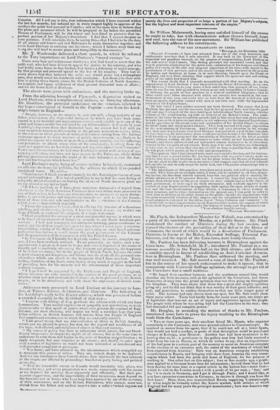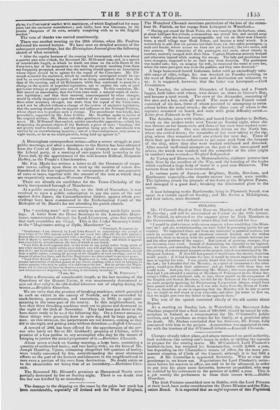Mr. Finch, the Independent Member for Walsall, was entertained by
a party of his constituents on Monday, at a public dinner. Mr. Finch condetnned the conduct of Ministers during the last session, and warned the electors of the probability of their defeat in the House of
Commons, the result of which would be a dissolution of Parliament.
Opinions in favour of the Ballot, Extended Suffrage, Triennial Parliaments, and the repeal of the Corn-laws, were loudly cheered.
Mr. Poulton has been delivering lectures in Birmingham against the Col 11.1aws. Mr. Scholefield, M. P., introduced Mr. Puulton to a numerous assembly in the Town-hall on the 26th ultimo; and delivered a sensible speech in favour or establishing an Anti-Corn-law Association in Birmingham. Mr. Paulton then addressed the meeting, and was well received. Alr. Salt moved a vote of thanks to Mr. Poulton; but in the course of his speech endeavoured to make it appear, that in comparison with Universal Suffrage agitation, the attempt to get rid of
the Corn-laws was a small matter
" He hoped their excellent lecturer, and the gentlemen around him, would abandon any little measure, such as the agitation of the Corn-laws, and throw thentselves at truce into the grand agitation that was then going on throughout the kingdom. They were aware that there was a great and mighty agitation going on; and he did not think that it was worthy of their great influence, and zeal, and patriotism, to confine themselves to that one little simple point of relief. The lecturer bad only shown them one spot, but Mr. Salt could show them many others. There bad hardly been, fur many years past, one single act of legislature that was not an act of injury and oppression against the people. The people with whom he was acting had left the Corn-laws in the rear; they had demanded full and complete justice."
Mr. Douglas, in seconding the motion of thanks to Mr. Poulton, mentioned some facts to prove the injury resulting to the Birmingham
trade from the Corn-laws " Two or three years ago, their excellent friend Mr. Muntz, who exported extensively to the Continent, seut some printed calicoes to Canstantiuople. lie received an answer from his agent, that if he could not sell at a lower figure, they would nut find a market, as goods of that description could be purchased cheaper at Kalouga, near Moscow. Another fact hail been mentioned in his hearing that nista: a gentleman in the gallery near him had lately received a letter Irons his son in ltussia, in which he writes to say, that an acquaintance of his had gone to a certain part of the country to assist an American company in the erection of an extensive mill, the entire of the machinery of which bad been exported from America! Here was an American company establishing manufactures in Russia, and bringing with them born Ametica the very steamengine which had been the pride anti boast of England, for the purpose of working it. One other fact on this subject four or five months ago, a gentle. man applied to a German house here for information ; he told them that he had been dealing for sonic time in a capital article in the button line—mark that— which hut sold in the London Matket with a profit of 245 per cent,; ' but,' stud he, it is made in Germany, and I get it through Paris; and I would like, as you have extensive connexions in Germany, to receive it through you from the first hauil.' Here, then, was semi-civilized Russia supplying Constantinople, or what might be virtually called the Asiatic market, with articles of which Euglaud had fur many years the principal manufacture; here was America sup plying the Continental market with machinery, of which England had for many years had the exclusive manufacture; and, lastly, here was Germany, by the greater cheapness of its corn, actually competing with us In the English market."
The vote of thanks was carried unanimously.
There was another meeting on the 29th ultimo, when Mr. Paulton delivered his second lecture. We have seen no detailed account of the subsequent proceedings, but the Birmingham Journal gives the following sketch of what occurred.
" After the regular business of the evening had terminated, which was about a quarter past nine o'clock, the Reverend Mr. 11PDonnell rose, and, in a speech of considerable leogth, in which he dwelt not alone on the evils direct of the Cormlaws, but of the temptation to vice that the poverty resulting from them too frequently presented, moved that the meeting should approve an Association whose object should be to agitate for the repeal of the Corn-laws. Mr. Edmonds seconded the resolution, which he confidently anticipated would be car. ried by an overwhelming majority; and in so doing, contended, that it was the duty of the meeting, and of all Reformers, while they continued to press for a change in the system of imperfect legislation, not to neglect the cure of such particular wrongs as might arise out of its workings. To this resolution, Mr. Salt moved an amendment, that the Corn-laws were a natural result of exclusive legislation ; and that their removal, unaccompanied by other changes, would be wholly inoperative upon the comforts of the masses of society ; and as these other necessary changes, any more than the repeal of the Corn-laws, cou'd not be effected without a change of the system of exclusive legislation, that the meeting should give its support and influence to the National Petition, whose object was to produce such a change. The amendment was briefly, but powerfully, supported by Mr. John Collins. Mr. Boultbee spoke in favour of the original motion; Mr. Muntz and other gentlemen in favour of the amendment. Mr. M‘Donnell then replied, amidst considerable opposition—which his designating the present objects of the Radicals a piece of mere humbug,' did not greatly tend to diminisl.; and the question being put, the amendment was carried by an overwhelming majority ; out of a thousand persons, only seven or eight hands, so far as we could perceive, being held up against it."



























 Previous page
Previous page